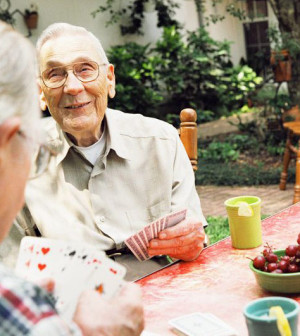- Could Your Grocery Store Meat Be Causing Recurring UTIs?
- Are You Making This Expensive Thermostat Error This Winter?
- Recognizing the Signs of Hypothyroidism
- 10 Strategies to Overcome Insomnia
- Could Artificial Sweeteners Be Aging the Brain Faster?
- Techniques for Soothing Your Nervous System
- Does the Water in Your House Smell Funny? Here’s Why
- Can a Daily Dose of Apple Cider Vinegar Actually Aid Weight Loss?
- 6 Health Beverages That Can Actually Spike Your Blood Sugar
- Treatment Options for Social Anxiety Disorder
J&J to Rely on Bioethicists for Guidance on New Drugs for Dying Patients


In a pilot program that could have wide-ranging impact, the drug maker Johnson & Johnson will have independent bioethicists determine whether dying patients should be allowed emergency access to experimental medicines.
The program is a partnership between Johnson & Johnson’s Janssen Pharmaceutical Cos. and New York University’s medical ethics division, the Associated Press reported Thursday.
NYU’s head of medical ethics, Arthur Caplan, will create a committee to evaluate cases where patients ask for so-called compassionate use of experimental drugs. The committee will advise Janssen, which will make the final decision.
Johnson & Johnson said the program will initially be for one yet-to-be-named medication, but it will be expanded if it’s considered successful, the AP reported.
The pilot program could be a model for other drug companies, according to Caplan. Janssen will pay a standard fee to the medical school for the committee members’ work. Caplan will not be paid, the news service said.
The typical way for gravely ill patients to gain access to experimental drugs is by taking part in clinical trials. Some companies also have “expanded access programs” that give patients access to promising drugs that have completed major studies and are being reviewed by the U.S. Food and Drug Administration, the AP reported.
If neither of those routes work for patients, their doctors may ask for compassionate use of an experimental drug. Legitimate requests are usually approved by the FDA, but drug makers don’t have to agree.
They may refuse because they don’t have enough doses of the drug, don’t consider the patient a good match, or fear that a bad result could reduce the chances the drug would be approved by the FDA, the AP reported.
John Thomas, a professor who teaches law and medicine at Quinnipiac University School of Law in Hamden, Conn., said, “The pharmaceutical industry and society should applaud Johnson & Johnson for its embrace of a thoughtful, compassionate and systematic approach to responding to compassionate use queries.”
“For too long,” Thomas added, “pharmaceutical manufacturers have practiced ad hoc allocation of experimental treatments. Johnson & Johnson’s new approach, should it prove successful, can provide a model for the industry.”
More information
To learn more about care for the terminally ill, visit the Mayo Clinic.
Source: HealthDay
Copyright © 2026 HealthDay. All rights reserved.










